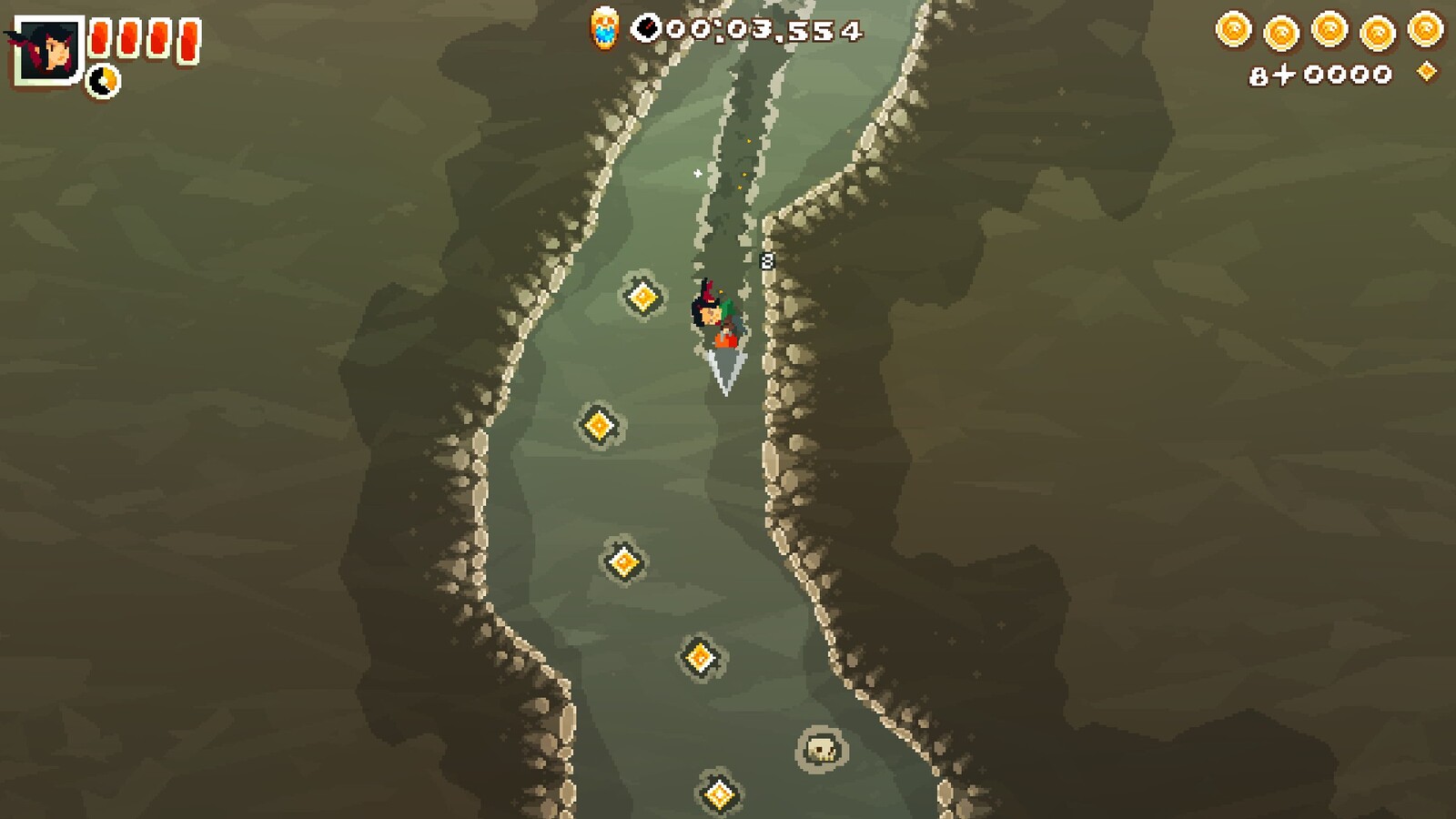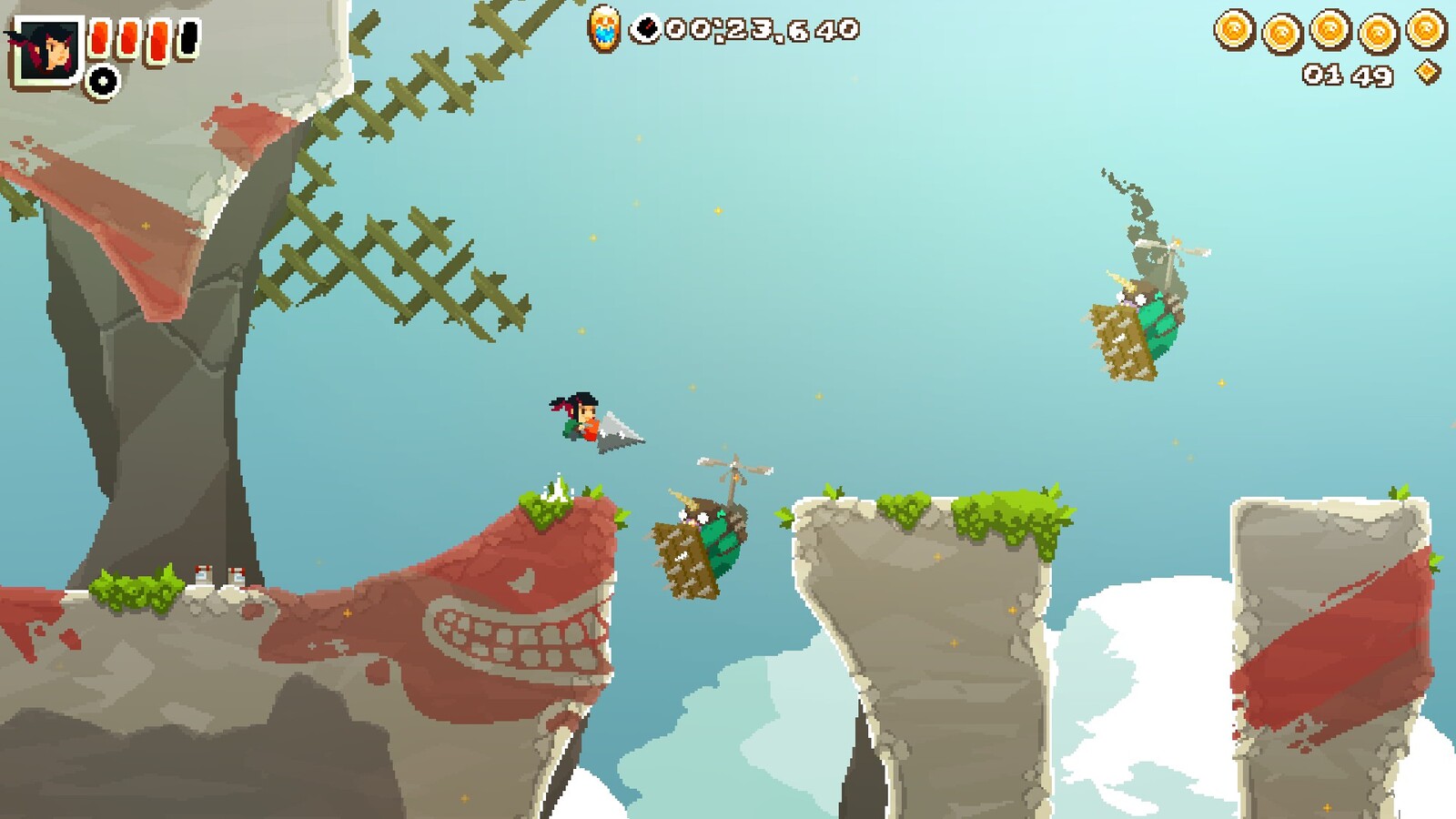Pepper Grinder keeps you moving forward. Armed with a drill and a propensity for ramming it into whatever stands in front of you, you’ll constantly find new ways to push onwards as you play. The steady momentum of the game creates distinctive platforming challenges that stay fresh throughout its relatively short duration. In its haste, however, Pepper Grinder neglects to smooth over some speed bumps, making for a pleasant if occasionally bumpy ride.
Let’s start at surface level: the drilling mechanic is a lot of fun. You may think you know the gist of what drilling looks like in a game, yet I assure you that it’s more complicated than it seems. As long as you’re holding the drill button down, you’ll dig into whatever you happen to rub up against, whether that’s specific types of dirt, conveniently drill-controlled mechanisms, or bad guys who seriously need to get out of your way. Context matters here.
In Pepper Grinder, drilling is less of an action and more of a reaction to whatever happens to be around you. Dispatching foes remains relatively simple no matter what, but the actual “mechanic” of drilling can lead to dramatically different types of gameplay depending on what you drill. Drilling against dirt or rock debris will suck you into it, propelling you forward and then launching you out of it once you reach the end. Digging comes the closest the game gets to a consistent drilling mechanic – everything else varies wildly. Locking your drill into anything from mini guns to snowmobiles to giant mechs introduces new sets of rules and ways to control the game. The variety of ways to use the drill prevents the experience from becoming overly formulaic all the way to the end.
At the same time, Pepper Grinder avoids underdeveloping its ideas through clever nuances contained within these eclectic mechanics. Drilling through different surfaces gradually becomes more complicated – a dash mechanic can be combined with the way you launch out of dirt for super-powered launches that shoot you extra far, which the level design often uses to great effect for crossing perilous gaps. Most levels provide either clear iterations on their ideas in the same vein as this, or at the very least small “tricks” to keep things engaging for skilled players. For example, you can also use your drill to swim underwater, which differs from digging into dirt due to the slower speed and lack of a dash. Even in a situation like this, however, I discovered that you can use a carefully timed dash when exiting out of water and landing on its surface to quickly skip across the body of water like a tossed stone, speeding these sections up significantly.
This game’s greatest strength lies in its ability to seamlessly flow through all of its ideas in rapid succession. Within seconds you can jump from traditional platforming to launching through pockets of dirt to blasting out of cannons. Within minutes, you can play a level focused on a snowmobile to one all about blowing things up with rockets. It’s a quick-paced game without being a disjointed one. The drill functions as the common denominator that ties it all together into a coherent bundle.
When you hang out on the surface level, this all works well enough. It’s only when you drill into the details that you discover that not everything holds up to the pressure.
There’s a zen-like quality to blowing through Pepper Grinder’s stages that sometimes feels at odds with its potential. A laid-back approach isn’t inherently a bad thing; in this case it even complements the game’s generally subdued soundtrack. However, I can’t help but feel like an opportunity was missed in the overall game design to push the player in a meaningful way. The challenges may be clever and varied, yet they lack bite. Some parts prove slightly more difficult than others, yet even when I fell down a pit, I’d respawn just inches away. When I died, I’d rarely be sent back more than 10 seconds. Only the handful of boss battles require any significant stretch of proper play to survive.
In what is likely an effort to curb any potential frustration of the masses, Pepper Grinder essentially removes all of the tension its mechanics could inspire. When playing the game, I often felt like I was flying through its challenges. Sometimes you literally are, but that’s besides the point. This isn’t a particularly long game and I blew through it so painlessly that it felt like I never truly had time to connect with any one idea. I can’t totally blame the game for taking it easy on its player base – that’s how a lot of games these days are designed. Still, in this case I felt as though being even just slightly meaner would have given its treasure trove of ideas more time to breathe.
Of course, that’s only really a problem if you’re doing a casual playthrough. You know, for casuals. Pepper Grinder specifically labels a normal run through each level as “Casual Play,” more or less implying that the real meat of the game lies in its secondary “Time Attack” mode. Thanks to the above mentioned nuances in the controls, I admit that there’s certainly a lot of meat for speedrunners to chew on here. Still, after drilling into it myself, I unearthed some more things to complain about.
I don’t think there’s a particularly kind way to say this so I’ll just say it: speedrunning revealed to me that Pepper Grinder is kinda sloppy. The controls and especially the enemy hitboxes lack precision that can make the game frustrating in ways that may not be evident during a casual playthrough. That water skipping trick I described earlier can be pretty finicky to get working. Maybe there’s a trick to it I can’t grasp – if there is, however, I couldn’t figure out what the difference was between the times where it did work and the times it didn’t.
There’s a lot of that when it comes to the moment to moment gameplay. If you don’t speed through dirt in just the right time and at just the right angle, you can easily miss opportunities to shave off tons of time. How you perform those opportunities consistently beats me – it never felt entirely intuitive control-wise. There’s a looseness to the controls that when played at a higher level that gives it a pervading sense of inconsistency. I’m sure dedicated players will be able to work this all out eventually, but to me successful runs often felt less like I was speedily shooting through dirt and more like I was digging into haystacks looking for just the right needle. Sometimes you find the fun, other times you’ll experience an unwelcome stabbing sensation.
Part of the difficulty here may admittedly boil down to your choice in controls. This is the only 2D platforming game in recent memory where I actually preferred using a control stick over a d-pad simply because it fits the digging controls better. During a time trial where any slight mistake can turn into a reset, I never felt inclined to take risks.
That only makes it more frustrating when you have a great run going only to accidentally ram into an enemy’s hitbox that extended ever so slightly further than expected. I don’t want to whine too much here, but I genuinely think there’s something off about the hit detection in this game. I’ve been knocked around by enemies without physically touching them on more than one occasion. I get a little uneasy even approaching an enemy in this game just because I never feel 100% confident that I won’t take damage in some freak accident.
On a casual playthrough none of these quirks seem like a big deal. During a speedrun, it made for a frustrating time full of resets. In a way, the time trials do indeed contain the kind of tension I was looking for during my “casual” playthrough, but it wasn’t necessarily there for the right reasons. Even then, I’d be lying if I said I didn’t have a fun time getting “gold” times anyway, it’s just not something I felt compelled to do for every stage in the game.
Beyond speedrunning, however, Pepper Grinder doesn’t give you much else to do. You can collect hidden coins that can be used to unlock a few extra levels or pages of a sticker book. I do love the stickers – through getting good speedrun times or simply dumping jewels you find into a gacha machine, you unlock stickers of the entire game’s cast of characters. You can then combine these stickers with the pages you unlock to create your own custom Pepper Grinder scenarios. Pretty cute!

























